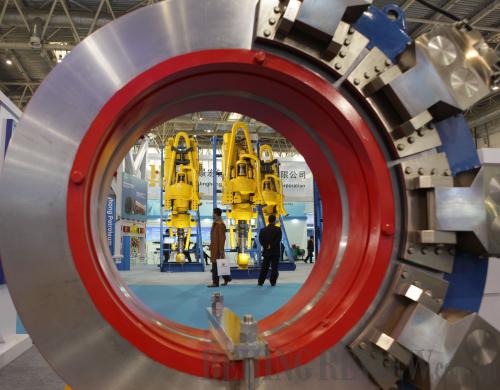|
 |
|
PETROLEUM INTEREST: The 10th China International Petroleum & Petrochemical Technology and Equipment Exhibition was held March 22-24 in Beijing. Nearly 1200 enterprises from 37 countries and regions brought their latest technologies and equipment to the show (LUO WEI) |
Bribery Scandal Trial
Stern Hu, Rio Tinto's leading iron ore salesman in China, admitted taking bribes in a partly open hearing held March 22-24 in Shanghai.
The guilty pleas may be an embarrassment for Rio, which has been saying its employees are innocent and is again involved in tough iron ore price negotiations with China.
Rio Chief Executive Tom Albanese said in Beijing that he did not want to jeopardize business ties with China.
"This issue is obviously of great concern to us," Albanese said. "I can only say we respectfully await the outcome of the Chinese legal process."
"We remain committed to strengthening our relationship with China, not just because you our biggest customer, but because we see long-term business advantages for both of us," Albanese said.
The four employees from Rio's iron ore team, including Hu, were detained last July when Rio was acting as lead negotiator for global iron ore suppliers in price talks with Chinese steel mills. Hu was Rio Tinto's senior executive in China in charge of iron ore.
The four were also accused of seeking information about Chinese mines and mills.
Private Vitality
China will further open up state-controlled sectors to private capital to put the economy on a more sustainable footing.
At a meeting on March 24, the State Council, China's cabinet, pledged to allow more private investors into a series of sectors, including transportation, telecommunications, energy, financing and social welfare.
The good news comes as concerns grow over the prospects for private enterprises, which received a heavy blow from the economic downturn.
Efforts will also be made to help private companies move up the value chain and press ahead with technological innovation, as well as seek expansion through mergers and acquisitions, said the State Council.
In addition, the country will also support private companies with heavier government procurement and better services, such as streamlining the approval procedure for their investment.
Analysts believe this will help prop up productivity of the state-controlled sectors and breathe fresh life into the economy. Data from the IMF indicated returns on invested capital for average Chinese private companies is 50 percent higher than their state-owned counterparts.
Australian Energy JV
PetroChina Co. Ltd., China's largest oil and gas producer, announced on March 22 an agreement for a joint bid with Shell to acquire Arrow Energy Ltd. after raising its offer to 3.5 billion Australian dollars ($3.15 billion).
Under the deal, a joint venture between PetroChina and Shell would own Arrow's coal seam gas assets in Queensland and domestic power business.
Ge Aiji, a project manager with PetroChina, said the proposal would create jobs and generate additional economic activity for Queensland through exports of 7 million to 8 million tonnes of liquefied natural gas per year from the deal.
Singapore Trade Ties
Economic collaboration between Singapore and east China's Zhejiang Province received a boost as Singapore-based companies and Zhejiang cities inked agreements to strengthen cooperation at the sixth Singapore-Zhejiang Economic and Trade Council meeting held in Singapore on March 23.
The council agreed on a 2010-11 work plan, which will focus on six key areas, namely trade and economics, environmental services, transportation and logistics, information technology, tourism, and modern services.
According to data from the Zhejiang Foreign Trade and Economic Cooperation Department, in 2009 bilateral trade between Singapore and Zhejiang amounted to $1.99 billion, a decrease of 15 percent year on year. | 